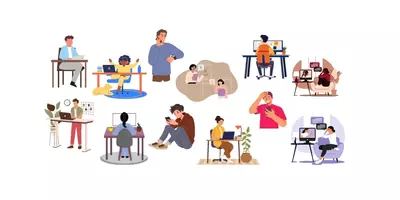
10 Oct 2025 ● Harmonia Careers
The Story the Numbers Don’t Tell: Why We Need Your Voice in Mental Health Workforce Data

Across the UK, mental health services are facing an unprecedented challenge.
Demand for care is rising faster than ever, yet the workforce that supports it is stretched to its limits. According to recent NHS workforce reports, there are thousands of unfilled roles in psychology, counselling, and community mental health — and this shortage is affecting patient care and staff wellbeing.
That’s why we've launched the Mental Health Careers Survey 2025 — to hear directly from the people who make mental health care possible.
Every voice matters. Whether you’re a student, practitioner, or someone seeking work in the field, your experience helps us understand what’s working, what’s missing, and what needs to change.
— Laura Mort, Co-founder and Director of Harmonia Careers

Behind the Headlines: What the Data Shows
NHS England reported there were approximately 289,000 'therapy professionals' in the UK as of March 2023, which includes counsellors and psychotherapists, but specific, up-to-date employment numbers for just counsellors and psychotherapists is not readily available.
The NHS workforce data for its Talking Therapies services (formerly IAPT) in England shows a significant increase in low and high intensity staff, rising by 45% from 2019 to 2022.
More than 6,700 new mental health professionals have been recruited since July 2024, as the government prepares to unveil its 10 Year Health Plan, which promises sweeping reforms to mental health care across England.
— National Health Executive

Demand for mental health services
About 1.97 million people were in contact with mental health services in November 2024 (NHS England), up ~6.3% compared to a year earlier and up ~43% from pre-pandemic levels. Nearly half a million (466,203) were children and young people.
Centre for Mental Health cites that in 2023 there were 76,513 accredited mental health professionals in the UK. Of these, excluding those working in public/NHS roles, an estimated 29,784 are working in private practice or self-employed capacity in therapy, counselling, or similar services. 19.2% of staff (2,648 WTE out of 13,779 WTE) are employed by the private sector. GOV.UK
Health Education England also reports that Children & Young People’s Mental Health (CYP MH) Workforce has also seen a significant growth of 39% (whole-time equivalent staff) in CYP mental health services in England since 2018. hee.nhs.uk
2021-2022: COVID Response
- Surge in mental health needs due to the pandemic.
- Rapid adoption of digital and online mental health services.
- Emergency measures were implemented to address workforce shortages.
- Social care and social work support, including Approved Mental Health Professionals (AMHPs), were crucial in providing crisis mental health support and reducing unnecessary inpatient admissions.
2022-2023: Maintaining Continuity Amid Recovery
- The workforce faced increased demand and more severe cases.
- Collaboration between providers, commissioners, and service users was essential to maintain safety and service effectiveness, despite declining public funding and rising operational costs.
- Policy goals to establish a balanced partnership between statutory services and the Voluntary, Community, and Social Enterprise (VCSE) sector are still a work in progress.
2023-2024: Workforce Stabilisation Amid Loss of Expertise
- Emphasis on workforce diversity and cultural competency, though specialist workforce numbers continue to decline.
- Hybrid care models have shown promise, though digital exclusion remains a challenge, particularly for people with severe mental illness, minoritised communities, and those with lower socio-economic status.
Data Reference: Transformation of the Mental Health Social Care Workforce
By end of FY 2023/24 there were ~621,500 employees in the mental health social care workforce, with over 13,500 vacancies still to fill.
— Association of Mental Health Providers

Why Your Voice Matters. Be Part of the National Conversation.
Yet with all these reports and national statistics, there’s still no centralised data drawn directly from mental health professionals themselves. We don’t know with confidence how many people are working in private practice, how many are seeking paid employment, or how many are struggling to find funded training and roles.
The existing figures tell us part of the story — but not the lived reality of the workforce delivering care every day. That’s why we’re asking people across the sector to share their experiences through this survey. The more voices we hear, the clearer the national picture becomes — and the stronger the case for investment, workforce planning, and meaningful change.
— Laura Mort, Co-founder and Director of Harmonia Careers

Who Should Participate
This survey is open to anyone actively pursuing or working in the mental health sector, including students, trainees and qualified professionals:
- Counsellors and psychotherapists
- Mental health coaches
- CBT practitioners and psychological therapists
- Psychologists
- Social workers and nurses specialising in mental health
- Other professionals working mental health and wellbeing roles
Your input is invaluable — together, we can build a stronger, more informed mental health workforce for the future.


